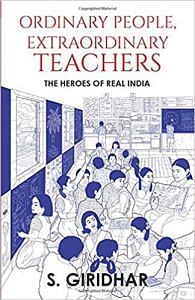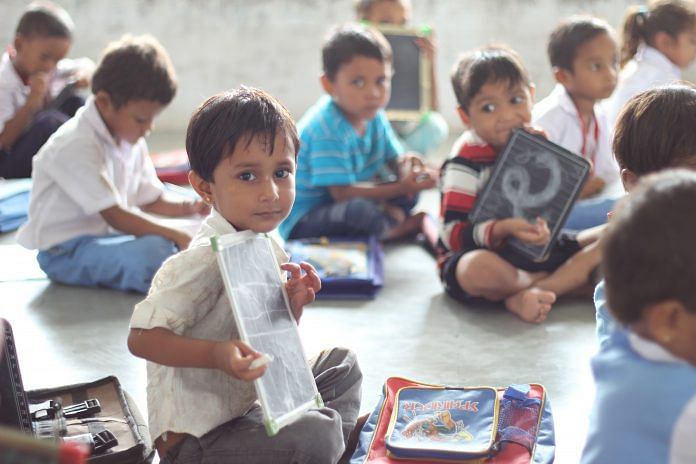The Model Upper Primary School in the village of Laata, perched high in the serene hills of the Bhatwari block [Uttarkashi District, Uttarakhand], is special. It has thirty-nine children enrolled in Classes VI, VII and VIII. Of these, twenty-three are girls and sixteen, boys. Because it is a designated Model School, it is also well-resourced with an adequate number of rooms, reasonably-good infrastructure, a good-sized playground (a rarity in the hills) and five teachers.
The five teachers form a competent team— the head teacher, Chandramohan Singh, who is just two years away from retirement; the English teacher, Narendra Singh Chauhan at fifty, another veteran; Kushlaprasad Bhat, who teaches Hindi and Sanskrit; Balwant Singh Bisht who teaches social science; and the maths and science teacher, Shoorvir Singh Kharola. There is not a person in Uttarkashi’s education network who has not heard of Kharola.
The head teacher and the other teachers know that Kharola is among the finest maths and science teachers in the district and have the wisdom to come together as a cohesive team to complement Kharola.
Also read: Models, diagrams & graphs — how CBSE Class 12 students are tackling first Maths practicals
Kharola is almost sixty but since he was awarded the ‘Rajya Shikshak Puraskar’ in 2004, he qualified for a two-year extension of service. Shoorvir Singh Kharola is a short, broad-built, soft-spoken man whose age sits lightly on him. His enthusiasm for scientific phenomena and his sense of wonder at the world around him can only be described as ‘seriously contagious’. His inventiveness and ability to use anything and everything around him—cardboard, calendars, old wedding invitation cards—to convey scientific concepts or mathematical principles makes learning an adventure into the unknown for his students.
Even after spending an entire day with Kharola, one is reluctant to leave because he still has so much more to show and share. The subjects he teaches his three classes may be maths and science but his approach and influence on the children and other teachers are not limited to these.
For the children, therefore, the three years at this school are a special learning experience, something that those who have opted for private schools shall miss. When Kharola discusses maths and science education with visitors to the school, he is most comfortable walking them around so he can point to all the things that he connects the science curriculum with. Mushrooms, frogs, moss, lichen, berries, gourds and birds in the surroundings augment the textbooks as he takes the children through the designated syllabus.
In the room where he has collected precious teaching resources over decades—geo-boards for shapes and areas, a prime number gameboard and a fraction wall—his joy is akin to that of a child in a toy shop. It is easy to see how the concept of fractions, highest common factor, lowest common multiple and prime numbers, all come alive for children in his class.
Maths and science blend seamlessly together for the children of this school. On a bench is the cross section of a tree and a hint of mischief is clear on his face as Kharola asks us to estimate the age of the tree. When we flounder, he shows us the correct way to count the rings on the transverse section of the trunk and gives us another chance. ‘I planted this tree and I was here when it was cut, so who but I should know the answer!’ With a laugh, he puts us out of our discomfiture. Lying on his table is a bird’s nest. When a bird began building its nest in their school compound, Kharola co-opted his students into a project to study the nest from egg to flight. Research ethics were explained—no touching, no disturbing, just quiet observation and jotting down of notes. Among the fascinating things that the children learnt in this fourteen-day project was that the mother bird kept her nest clean by picking and throwing out with its beak all the baby birds’ droppings.
Kharola’s students also recall how he explained the concept of light and its constituent colours by spraying water from the garden hose against the sun and creating a rainbow on a bright summer day.
Also read: How Haryana made government school education a political priority
Recently, when the computer was stolen from the school, Kharola was distraught. But only for a short while. On a visit to Dehradun, when he saw a man selling a six by four-inch rectangular magnifying lens in a pink plastic frame for Rs 150, an idea struck him and he bought it in a flash. Today, to show a video to his students, he just places this pink-framed lens in front of his mobile phone screen for all of them to watch.
Kharola tells us that the science and mathematics workshops organised by the Foundation in Uttarkashi have been one of the best initiatives in the capacity-building of teachers. He points to a large chart with prime numbers and shows how he has also added other interesting aspects to the chart thanks to the practical tips provided by the facilitator. Kharola is a regular at VTF meetings at Uttarkashi, both as a participant absorbing new ideas and as a resource person contributing from his rich experience. Kharola’s magnetic pull on his community of science and maths teachers is one of the major strengths for the district’s continuing efforts to build academic and pedagogic capacity among teachers.
He plays a significant role in leveraging the various WhatsApp groups that he is a part of—teachers of the block, science teachers of Uttarkashi, maths teachers of Uttarkashi—by regularly sharing inputs, insights and topical news. Within a year, there were over a hundred members in the maths group and over sixty in the science group. Their commitment to learning is such that on a rainy Sunday evening when few people would have left the comfort of their homes, one hundred and twenty-five teachers of Uttarkashi thronged a hall to listen to Devendra Mewadi, a well-known speaker, on the philosophy of science.
Kharola, who is perhaps one of the flag bearers among India’s government school teachers devoted to developing scientific temper among children, is, ironically, not a science graduate. He began his journey as a teacher nearly thirty-six years ago on a salary of Rs 440 after completing his Intermediate and BTC.
His first posting was to a remote village school of Sanglai in Tehri, which had forty children. As he started working with the children there, mysteriously, vegetables, milk, grains and cereal started arriving on his doorstep. It was the community’s way of showing their gratitude. A year later, in March 1982, he officially joined the government education service as a teacher for the upper primary classes and was posted to the Bhatwari block of Uttarkashi district. As time went by, Kharola completed his BA and MA in Hindi and sociology through correspondence programmes.
Also read: What the Delhi school education model is and why Maharashtra is looking to emulate it
After the stint at the Sanglai school, Kharola taught for eight years at Dilsaur. It was in 2001 that Kharola was transferred to the Upper Primary School, Laata. Even as he now draws up to the end of what has been a most successful and fulfilling journey, Kharola’s enthusiasm for science and maths shows no trace of waning. Like all outstanding teachers, Kharola is a reflective practitioner and something that epitomises this is his daily diary. Writing a daily log has been an old habit and he shows it without hesitation. The first volume has over two hundred and fifty neatly-written daily notes, some as concise as two hundred words, while others run into several pages. These are the reflections of his day at school, the joys and struggles of teaching.
In simple Hindi, he has unfailingly recorded his experiences—from the fulfilment in watching his pupils learn about the lifecycle of birds from real experience; through his frustration at not being able to convincingly explain ‘moss and ferns’ to them; to an emotional essay on a sad and troubled new child in the school. Kharola’s diary would be a precious educational resource for young teachers. Sometimes, he posts some of these diary jottings on the WhatsApp groups.
The National Education Policy and the National Curriculum Framework, for many decades, have emphasised the need to inculcate a scientific temper among children. But this remains confined to documents because of the vice-like grip of rote learning and the tyranny of admissions to higher education institutions based on examinations marks. To break free from this and create classrooms that encourage the spirit of enquiry is a mammoth, uphill task, even in city schools that are considered progressive and have all the necessary equipment at their disposal. Which is why people like Shoorvir Singh Kharola in remote rural schools are trailblazers. They may not have formal degrees in science or the access to sophisticated equipment but their methods are unarguably those that kindle scientific enquiry in the minds of children. When you see Kharola in action, you see hope.
 This excerpt from Ordinary People, Extraordinary Teachers: The Real Heroes of India by S. Giridhar has been published with permission from Westland Books.
This excerpt from Ordinary People, Extraordinary Teachers: The Real Heroes of India by S. Giridhar has been published with permission from Westland Books.




Inspiring teacher like Soorvir S. Khahrolaji inspire many more and also bring about a positive &enriching environment in the field of education
Thank you, keep it up & all the best.
Sir, can u please give his number. I’m a science teacher from Delhi. Highly motivated and inspired by him.
बहुत खूब बखान किया गया है । खरोला जी जैसे शिक्षकों के लिए जितना लिखस जाय उतना कम ही कम है । हमें भी विभिन्न कार्यक्रमों में उनका सानिध्य मिला और हमने उनसे खूब सारी ऊर्जा भी बटोरी है । लेख में एक संसोधन है यदि सम्भव हो उनकी पहली पोस्टिंग संगलाई में नहीं कोरदी (टिहरी गढ़वाल) में हुई थी .